
 i_need_contribute
i_need_contribute

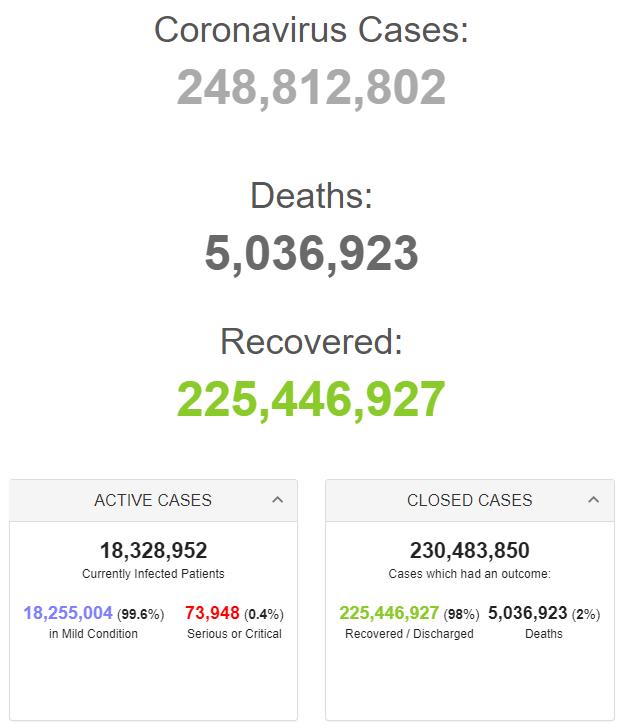

Retrieved from: https://www.worldometers.info/coronavirus/
By Sharon Bernstein
As soon as Anna Weber Kneitel learned San Francisco Bay Area pharmacies had opened appointments for COVID-19 vaccines for young children, she booked the closest one she could find for her 7-year-old son.
But across the country in Michigan, Rachael LaPlante said she was planning to hold off on getting the shots for her 7-year-old son, despite being fully vaccinated against COVID-19 herself.
After months of anticipation, the U.S. Centers for Disease Control and Prevention on Tuesday gave the green light for health professionals to start administering the Pfizer Inc (PFE.N)/BioNTech SE shot to children ages 5 to 11.
That left parents of roughly 28 million U.S. school-age kids facing the decision on Wednesday about how to proceed.
The authorization comes as children across the country are adjusting to in-person school attendance after more than a year of remote learning in some areas. Children currently represent more than 25% of U.S. infections and can transmit the virus to those around them.
But some adults who have been vaccinated against COVID-19 themselves are feeling more hesitant when it comes to doing the same for their young children.
"We have a group of parents who are so excited that they want us to give them a call as soon as we have the vaccine so they can make appointments ... and we have parents that are still questioning," said Dr. Kimberly Montez, an assistant professor of pediatrics at Wake Forest School of Medicine in North Carolina.
Some parents have expressed concern about the lack of long-term data on the vaccine's effects on children under 12. Others question its necessity given that severe COVID-19 is much less common for that age group, although many children have been hospitalized during the recent Delta variant wave.
LaPlante, 41, worries about rare cases of heart inflammation linked to the vaccine, particularly in young men, even though health experts say the heart risks from contracting COVID-19 are far greater.
"I struggle with it," she said. "What if it turns out that there are long-term problems for boys?"
LaPlante and her husband, who works from their home in Rochester, Michigan, continue to observe social distancing and masking protocols to protect against infection.
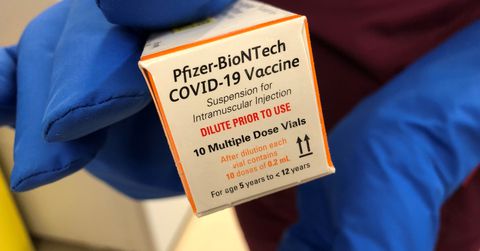
Meredith Vaughn, pharmacy vaccine coordinator at Atrium Health Wake Forest Baptist, unpackages the Pfizer COVID-19 vaccines for 5 to 11 year olds and places them in the ultra cold freezer until authorized to administer them, in Winston-Salem, North Carolina, U.S. November 2, 2021. Atrium Health Wake Forest Baptist/Handout via REUTERS
She said their son, who is home-schooled, plays outside with friends and sees his cousins for baking parties and other organized events over video chat services.
For Kneitel, a 41-year-old physician, getting her son vaccinated - and her daughter as soon as she turns 5 next year - means the family can return to a more normal social life. She said she is eager for them to resume sports and ballet, as well as going to concerts and theater performances.
GROWING LESS HESITANT
A Kaiser Family Foundation poll in August found that about a quarter of parents want their young children vaccinated "right away," with another quarter in the "definitely not" camp.
In interviews, pediatricians and public health experts said parents appear to be growing less hesitant as time goes on.
In Ellerslie, Georgia, Chrissie Jennette, 41, said she will get her three young sons vaccinated as soon as possible.
"I know there was concern that it was a quick rollout, but there was never a moment I was concerned," Jennette said.
But in the small Alabama city of Enterprise, Claire Deaton, 33, does not plan to make appointments for her children.
She has received a first COVID-19 shot, while her husband, a retired military pilot who now does training and is required to get vaccinated for work, so far has not. Both have had COVID-19 twice, and their children were never sick, she said.
Though her kids have received all of the regular childhood immunizations, Deaton said she does not see the COVID-19 vaccine as necessary for them so far.
"If things started changing and it was affecting more children, or if we had a huge outbreak in local schools, I would be more open to getting it," she said.
Retrieved from: https://www.reuters.com/world/us/some-parents-eager-others-unsure-covid-19-shot-approved-kids-2021-11-03/
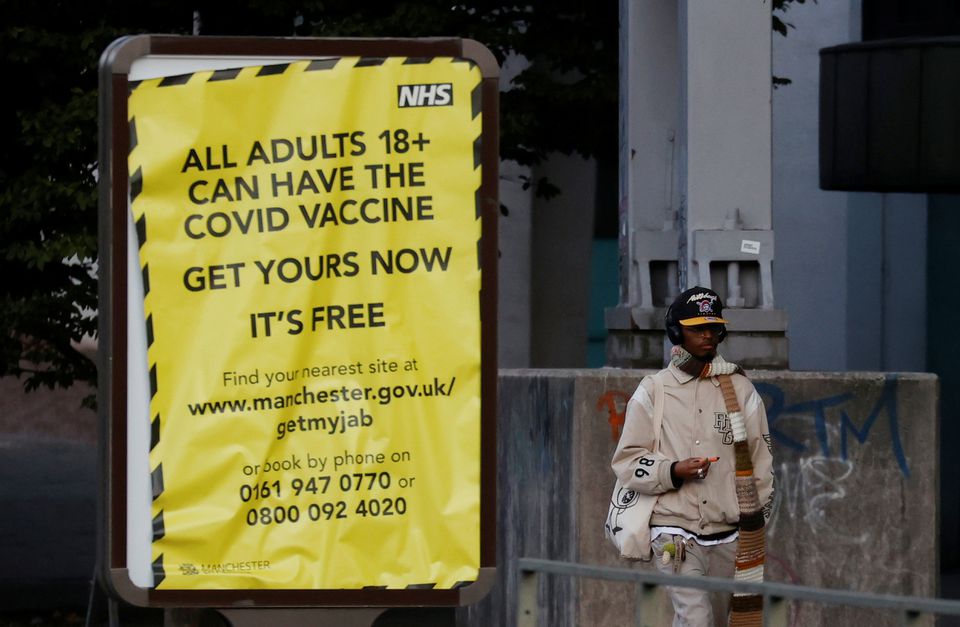
A man walks past a sign encouraging people to get their coronavirus disease (COVID-19) vaccine doses in Manchester, Britain, October 25 , 2021. REUTERS/Phil Noble
COVID-19 prevalence in England rose to its highest level on record in October, Imperial College London said on Thursday, led by a high numbers of cases in children and a surge in the south-west of the country.
Nearly 6% of school-aged children had COVID-19, the researchers found, although there was a drop in prevalence towards the end of the study's period coinciding with the closure of schools for half-term holiday.
Despite that dip, researchers said rates had doubled in older groups compared to September, a concerning sign as the government races to give booster shots to the most vulnerable.
"We did see a doubling in that group, and clearly that's the worry," Paul Elliott, the Imperial epidemiologist who leads the programme, told reporters.
"It's being driven from the young school age but it is going right across the whole population."
Prime Minister Boris Johnson has re-opened England's economy and is bidding to live with high levels of the coronavirus, saying that vaccinations have largely broken the link between cases and deaths compared to last winter.
The Imperial REACT-1 study estimated overall prevalence at 1.72% based on swabs collected between Oct 19-29, compared to 0.83% in September.
Elliot said that the figure was higher than the study's previously recorded high in January, though he noted that the study had not been in the field last December, when last winter's wave might have peaked.
The Imperial study found there was nearly a four-fold increase in prevalence in the south-west, the area impacted by an error at a private lab that resulted in an estimated 43,000 people wrongly being given negative PCR test results. read more
Elliott said that it was a "viable hypothesis" that the problems at the lab, run by a firm called Immensa, had contributed to the rise.
The study also found that 10.3% of sequenced swabs were of the Delta subvariant AY.4.2, which is under investigation by UK health authorities due to its growth in recent weeks, but has not been shown to cause more serious illness or evade vaccines.
Retrieved from: https://www.reuters.com/world/uk/england-sees-record-covid-prevalence-october-imperial-study-2021-11-04/
By Ana Ionova
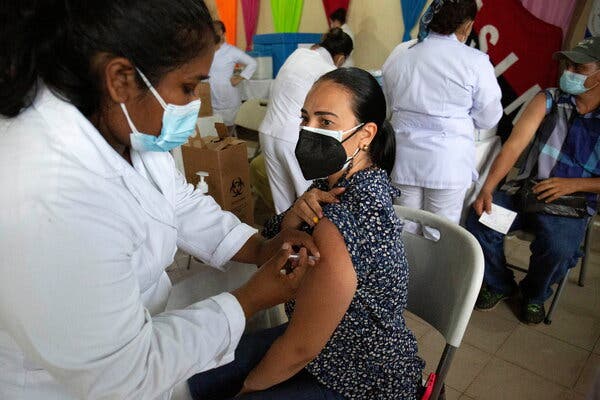
A woman receiving a dose of the AstraZeneca vaccine in Managua, Nicaragua, in September.Credit...Maynor Valenzuela/Reuters
Officials from the World Health Organization on Wednesday urged countries in Latin America and the Caribbean to limit administering booster shots and hold off on vaccinating children, allocating scant doses to the most vulnerable.
“In some countries, we have seen vaccine doses reaching all levels of the population before a high percentage of vulnerable” residents have been fully immunized, Dr. Jarbas Barbosa, assistant director of the Pan American Health Organization, a division of the W.H.O., said at a news conference.
Just 46 percent of people in Latin America and the Caribbean have been fully vaccinated so far, with supplies being slow to reach many countries, the organization said. Inequities have plagued the region, too. While Chile and Uruguay have vaccinated more than 75 percent of their populations, countries like Haiti and Nicaragua have administered two jabs to less than 20 percent of people.
Against this backdrop, vaccine supplies across the region must be distributed carefully and strategically, with the aim of reducing mortality and transmission of the virus among the adult population, Dr. Barbosa said.
“P.A.H.O. urges countries to prioritize the elderly, frontline workers and people with pre-existing conditions — to protect them, but also to prevent the health system from becoming overburdened with severe cases,” he said.
Offering vaccines to children and booster shots to others before high-risk groups are fully vaccinated — as the Dominican Republic has done — “may be defusing some of the efforts” to control the virus in the region, Dr. Barbosa added.
Still, echoing a recent W.H.O. recommendation, he stressed that older and immunocompromised people who received the Chinese-made vaccines Sinopharm or Sinovac Biotech will need a third shot to ensure they are fully protected against Covid-19.
“Their vaccination cannot be considered complete until they have received their third shot,” said Dr. Barbosa, noting that there is no evidence that healthy adults who have received two doses need another.
This could affect millions of people in Latin America and the Caribbean, where many countries — including Chile and Brazil — have relied heavily on the more readily available Chinese-made shots to speed up vaccination.
Vaccine supplies distributed through the United Nations-backed Covax program, meanwhile, are picking up pace, with Latin America and the Caribbean receiving around 64.3 million doses so far. Some 2.6 million doses have reached Venezuela, where the health system is especially fragile, and more supplies are expected in November.
New Covid-19 cases across Latin America and the Caribbean have been declining in recent weeks, offering an encouraging signal for the region, Dr. Barbosa noted. But he urged countries to stay vigilant and maintain public health measures, warning that the pandemic is not over.
“The declining case indices show that our approach is working,” he said. “And it is critical for all of us to stay the course until everyone is vaccinated and protected from the virus.”
Officials also warned about the possibility of a spike in infections with the onset of winter and the holiday season. As travel restrictions are lifted in many countries, tourism could pose an additional risk, said Dr. Sylvain Aldighieri, the Covid-19 incident manager at P.A.H.O.
“Social distancing and avoiding closed environments, together with mask wearing, are the most important tools for limiting the transmission,” Dr. Aldighieri said. “The public really has to incorporate these basic measures into their lifestyle, including beach, seaside and vacation activities.”
Retrieved from: https://www.nytimes.com/2021/11/03/world/latin-america-pressed-on-vaccine-priorities.html
By Claire Moses
The Netherlands has expanded some Covid measures, including requiring more mask wearing, in an effort to reduce the spread of the coronavirus and ease the growing pressure on the country’s health system.
Prime Minister Mark Rutte, in an announcement on Tuesday, described the changes as a “difficult message” to deliver, adding, “We’re going to have to ask more from people.”
Starting Saturday, the Netherlands will expand the list of places where masks are mandatory to include, for example, stores and university libraries and hallways. Face coverings were already required on public transport. Other places, such as museums and gyms, will not require masks, but visitors will need to show proof of vaccination, recovery from Covid or a recent negative test result, according to Mr. Rutte.
Mr. Rutte also emphasized the need for social distancing and urged Dutch people to work from home and to limit domestic travel.
“In this phase, everything depends on our own behavior,” he said.
Last week, about 54,000 people tested positive for the coronavirus, a 39 percent increase from the week before, according to Dutch government data, which also recorded a 31 percent rise in the number of Covid patients hospitalized week on week.
Hugo de Jonge, the Dutch health minister, said, “Beds are being freed up in hospitals for Covid patients again,” adding that the majority of those admitted had not had their shots.
“The inconvenient truth is that most of these patients would not have needed to be there if they had been vaccinated,” he noted.
By Niki Kitsantonis

Outside the Greek Parliament, in Athens, on Wednesday, health workers and demonstrators protest mandatory Covid-19 vaccines.Credit...Aris Messinis/AFP — Getty Images
As Greece broke another record in daily coronavirus infections this week, registering 6,700 new cases within the past 24 hours, the country’s health minister announced a series of new restrictions aimed at flattening the spike.
The restrictions, which are to apply from Saturday, relate to unvaccinated people, said the health minister, Thanos Plevris.
All unvaccinated workers — except those who work from home exclusively — must undergo two Covid-19 tests per week. A negative rapid or PCR test will also be required from unvaccinated people who want to access public services, banks, shops and hair salons. The same will apply at cafes and restaurants, which are allowed to serve the unvaccinated outdoors. The rules will not apply to supermarkets, pharmacies and churches.
The authorities will also intensify inspections and boost fines on businesses that violate regulations, increasing the minimum fine to 5,000 euros, from 1,000, Mr. Plevris said.
In addition, in a bid to boost a lagging vaccination drive, the government is launching a campaign to win over the unvaccinated, sending text messages to mobile phones and running notices in the media extolling the benefits of the vaccine. “Our key weapon in this phase of the campaign is the vaccine,” Mr. Plevris said, adding that “the more intense restrictive measures” imposed earlier in the pandemic were not an option, apparently referring to nationwide lockdowns.
The announcements came as Greece experiences a sharp upturn in its daily infection rate, breaking record after record: 4,696 on Saturday, 5,449 on Monday and 6,700 on Tuesday.
Last month the government lifted some pandemic restrictions, chiefly for vaccinated people, in regions where coronavirus cases have been the highest. In late September and early October, the daily infection rate appeared to have stabilized at around 2,000 new cases per day but started edging up late last month.
Greece — a nation of 10.7 million, where six in 10 people have been fully vaccinated — enjoys a vaccination rate similar to the rest of Europe. Mr. Plevris, the health minister, said on Tuesday that 63 percent of the general population has been fully vaccinated. The corresponding rate for the European Union is 64.3 percent, according to the vaccine tracker of the European Center for Disease and Control.
But other E.U. states have applied tougher restrictions on the unvaccinated. Italy has some of the bloc’s most stringent regulations, notably the Green Pass, a mandatory health certificate for Italian workers which has fueled violent protests across the country. France has introduced a similar pass, which has also met with vehement public opposition.
Protests in Greece have been regular but relatively small in size. On Wednesday, a rally in Athens against mandatory vaccinations for health workers drew a few hundred demonstrators.
Retrieved from: https://www.nytimes.com/2021/11/03/world/europe/greece-covid-restrictions.html
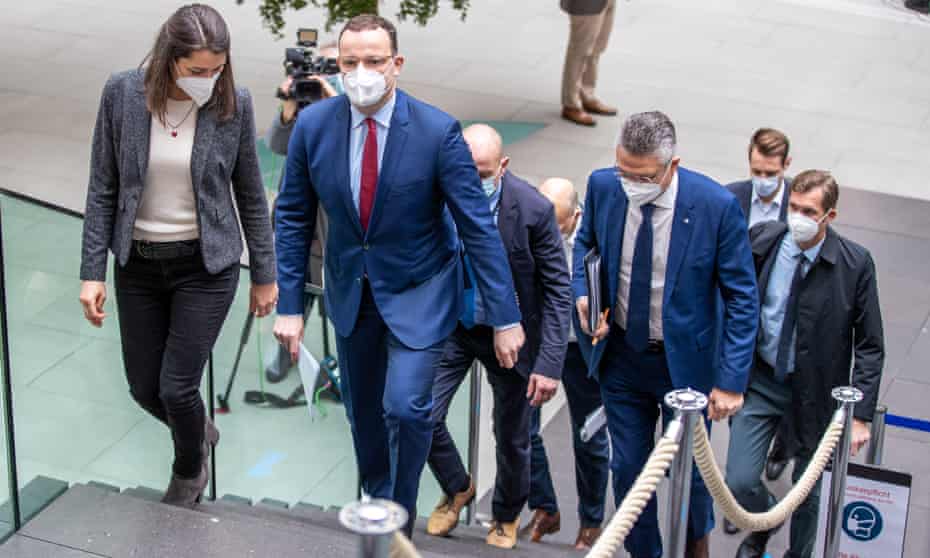
Jens Spahn (second left), the German health minister, in Berlin on Wednesday, attending a press conference on Covid booster vaccinations. Photograph: Action Press/Rex/Shutterstock
Germany’s health minister, Jens Spahn, has warned that his country is going through a “massive” pandemic of the unvaccinated.
“The pandemic is far from over,” said Spahn, a member of the Christian Democratic Union (CDU). “We are currently experiencing a pandemic of the unvaccinated, which is massive. There would be fewer coronavirus patients on intensive care units if more people would let themselves be vaccinated.”
In the last week several German clinics have raised alarm about rising numbers of patients with Covid-19 on the wards. On Wednesday authorities reported 2,220 patients in intensive care beds, the highest number since the start of June.
Over the last seven days 666 people have died from the virus in Germany, slightly more than in the same week a year ago, before the start of the vaccination drive and the arrival of the more infectious Delta variant. For now the number of fatalities is rising less steeply than it did during the previous three coronavirus waves in the country.
The head of Germany’s disease control agency, Lothar Wieler, described the recent rise in infection rates as frightening. “The fourth wave is developing in exactly the way we feared, because not enough people have received the vaccine,” said Wieler, who is president of the Robert Koch Institute.
The percentage of the German population fully vaccinated against Covid-19 has in effect flatlined for the last month at 66%, a lower rate than in other western European states such as France, Italy, Spain and the UK. Surveys suggest those who have refused a jab so far are unlikely to change their mind.
A number of high-profile people such as the Bayern Munich footballer Joshua Kimmich and the former Die Linke chairperson Sahra Wagenknecht have recently made public that they have declined to be vaccinated.
Unlike many of its southern European neighbours, Germany has not made vaccination mandatory for some professional sectors, such as care for elderly people, and on Wednesday Spahn reiterated that there were no plans to do so in the future.
Instead, the health minister pointed to recent numbers from Israel as evidence that governments could get on top of a fourth wave of the pandemic by quickly administering booster shoots to those who had received their vaccinations more than six months ago. “A booster shot can make a real difference,” he said. However, Israel has a much higher percentage of the population already vaccinated, estimated at above 80%.
In Germany’s federalised system, health authorities in each of the 16 states are responsible for setting up infrastructure that would allow vaccines to be administered en masse. Many of the vaccine centres set up at the start of the year have been in standby mode since September and would need to hire or train new staff to be reactivated.
Leif Erik Sander, a physician at the department of infectious diseases and respiratory medicine at Berlin’s Charité hospital, said on Wednesday that about 30 million people in Germany were already or would soon be in need of a booster shot, but vaccinations were only happening at a rate of about 150,000 people a day.
“It’s fairly easy to calculate that at this rate we wouldn’t be able to immunise these groups in time for this winter,” Sander said.
Retrieved from: https://www.theguardian.com/world/2021/nov/03/germany-enveloped-in-massive-pandemic-of-the-unvaccinated
Here’s a round-up of the day’s leading Covid stories:
· The Covid pandemic has caused the loss of 28m years of life, according to the largest-ever survey to assess the scale of the impact of the pandemic. The enormous toll was revealed in research, led by the University of Oxford, which calculated the years of life lost (YLL) in 37 countries.
· Germany is enveloped in a “massive” pandemic of the unvaccinated, health minister says. Jens Spahn has warned: “The pandemic is far from over. We are currently experiencing a pandemic of the unvaccinated, which is massive. There would be fewer coronavirus patients on intensive care units if more people would let themselves be vaccinated.”
· The US has administered 425,272,828 doses of Covid-19 vaccines in the country as of Wednesday morning and distributed 525,071,855 doses, the CDC said.
· Turkey will begin administering booster shots to people who have received two doses of the Pfizer Inc/BioNTech coronavirus vaccine, its health minister Fahrettin Koca said.
· France reports highest daily cases since mid-September. Health authorities reported 10,050 daily new Covid-19 infections on Wednesday, the first time the tally has topped 10,000 since September 14.
· The UK recorded another 41,299 Covid cases, and a further 217 deaths within 28 days of a positive test, in the latest 24-hour period. This is compared to 293 deaths and 33,865 positive infections reported a day prior.
· UK launches trial of drug to tackle fatigue in long Covid patients. The first trial of a drug, called AXA1125, is set to target the fatigue and muscle weakness experienced by more than half of people with long Covid/ The drug targets cellular power plants called mitochondria, which it is thought could be dysfunctional in the subset of long Covid patients with severe fatigue.
· The US is set to begin giving Covid vaccines to children aged five to 11, with roughly 28 million school-age kids eligible for the shots that provide protection against the illness.